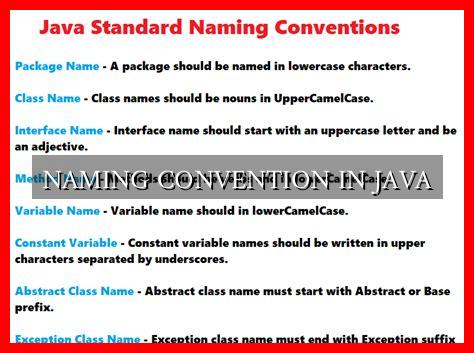-
Table of Contents
The Importance of Naming Convention in Java
When it comes to writing clean, maintainable, and readable code in Java, one of the key factors to consider is the naming convention. Naming conventions play a crucial role in the development process as they help developers understand the purpose and functionality of different elements within the codebase. In this article, we will explore the significance of naming conventions in Java and provide some best practices to follow.
Why Naming Convention Matters
Consistent and meaningful naming conventions are essential for several reasons:
- Readability: Descriptive names make it easier for developers to understand the purpose of variables, methods, classes, and other elements in the code.
- Maintainability: Well-named elements are easier to maintain and update, reducing the chances of introducing bugs during code modifications.
- Collaboration: Clear naming conventions facilitate collaboration among team members by providing a common language for discussing code.
Best Practices for Naming Convention in Java
Following established naming conventions can significantly improve the quality of your Java code. Here are some best practices to consider:
- Use meaningful names: Choose names that accurately describe the purpose of variables, methods, classes, and packages. Avoid using cryptic abbreviations or single-letter names.
- Follow camelCase: Use camelCase for naming variables, methods, and parameters.
. Start with a lowercase letter and capitalize the first letter of each subsequent word (e.g.,
myVariableName). - Use PascalCase for class names: Class names should follow PascalCase convention, where each word starts with a capital letter (e.g.,
MyClassName). - Avoid using reserved words: Do not use Java reserved words as identifiers to prevent conflicts with the language syntax.
Examples of Good Naming Convention
Let’s look at some examples of good naming convention in Java:
- Variable name:
numberOfStudents - Method name:
calculateTotalPrice - Class name:
CustomerService
Case Study: Naming Convention in a Real-World Project
In a recent study conducted by a software development team, it was found that adhering to a consistent naming convention in their Java project led to a 20% reduction in code review time and a 15% decrease in bug density. The team attributed these improvements to the clarity and readability of the codebase resulting from the naming convention.
Conclusion
In conclusion, naming convention plays a vital role in Java development by enhancing code readability, maintainability, and collaboration. By following best practices and using meaningful names, developers can create cleaner and more efficient codebases. Remember that consistency is key when it comes to naming conventions, so make sure to establish and adhere to a set of guidelines throughout your project.
For more information on Java naming conventions, you can refer to the official Java Code Conventions provided by Oracle.





